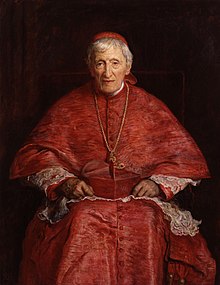This is an old revision of this page, as edited by Ajsdfaslkdfhasdggfyuw (talk | contribs) at 20:32, 4 June 2021. The present address (URL) is a permanent link to this revision, which may differ significantly from the current revision.
Revision as of 20:32, 4 June 2021 by Ajsdfaslkdfhasdggfyuw (talk | contribs)(diff) ← Previous revision | Latest revision (diff) | Newer revision → (diff)J.C.A. Gaskin challenges the first premise of the argument from moral objectivity, arguing that it must be shown why absolute and objective morality entails that morality is commanded by God, rather than simply a human invention. It could be the consent of humanity that gives it moral force, for example. American philosopher Michael Martin argues that it is not necessarily true that objective moral truths must entail the existence of God, suggesting that there could be alternative explanations: he argues that naturalism may be an acceptable explanation and, even if a supernatural explanation is necessary, it does not have to be God (polytheism is a viable alternative). Martin also argues that a non-objective account of ethics might be acceptable and challenges the view that a subjective account of morality would lead to moral anarchy.
William Lane Craig has argued for this form of the moral argument.
Argument for conscience

Related to the argument from morality is the argument from conscience, associated with eighteenth-century bishop Joseph Butler and nineteenth-century cardinal John Henry Newman. Newman proposed that the conscience, as well as giving moral guidance, provides evidence of objective moral truths which must be supported by the divine. He argued that emotivism is an inadequate explanation of the human experience of morality because people avoid acting immorally, even when it might be in their interests. Newman proposed that, to explain the conscience, God must exist.
British philosopher John Locke argued that moral rules cannot be established from conscience because the differences in people's consciences would lead to contradictions. Locke also noted that the conscience is influenced by "education, company, and customs of the country", a criticism mounted by J. L. Mackie, who argued that the conscience should be seen as an "introjection" of other people into an agent's mind. Michael Martin challenges the argument from conscience with a naturalistic account of conscience, arguing that naturalism provides an adequate explanation for the conscience without the need for God's existence. He uses the example of the internalization by humans of social pressures, which leads to the fear of going against these norms. Even if a supernatural cause is required, he argues, it could be something other than God; this would mean that the phenomenon of the conscience is no more supportive of monotheism than polytheism.
C. S. Lewis argues for the existence of God in a similar way in his book Mere Christianity, but he does not directly refer to it as the argument from morality.
Notes and references
- ^ Cite error: The named reference
Parkinsonwas invoked but never defined (see the help page). - Cite error: The named reference
Martinwas invoked but never defined (see the help page). - "The Moral Argument". Youtube.com. DrCraigVideos. January 21, 2015. Retrieved March 21, 2021.
- ^ Martin 1992, p. 214
- Parkinson 1988, pp. 344–345
Bibliography
- Adams, Robert (1987). The Virtue of Faith and Other Essays in Philosophical Theology. Oxford University Press. ISBN 9780195041460.
- Boniolo, Giovanni; De Anna, Gabriele (2006). Evolutionary Ethics and Contemporary Biology. Cambridge University Press. ISBN 9780521856294.
- Boyd, Richard (1988). Sayre-McCord, Geoffery (ed.). Essays on Moral Realism. Cornell University Press. Moral Arguments for Theistic Belief. ISBN 9780801495410.
- Craig, William Lane; Moreland, J.P. (2011). The Blackwell Companion to Natural Theology. John Wiley & Sons. ISBN 9781444350852.
- Everitt, Nicholas (2003). Non-Existence of God. Routledge. ISBN 9780415301060.
- Guyer, Paul (2006). Kant. Taylor & Francis. ISBN 9780415283359.
- Hare, John (1996). The Moral Gap: Kantian Ethics, Human Limits, and God's Assistance. Oxford University Press.
- Kant, Immanuel. Critique of Practical Reason. Part I, Bk. II, Chap. V.
- Mackie, J.L. (1982). The Miracle of Theism. Oxford University Press. Chap. VI.
- Martin, Michael (1992). Atheism: A Philosophical Justification. Temple University Press. ISBN 9780877229438.
- McSwain, Robert; Ward, Michael (2010). The Cambridge Companion to C.S. Lewis. Cambridge University Press. ISBN 9780521884136.
- Oppy, Graham (2006). Arguing About Gods. Cambridge University Press. ISBN 9780521863865.
- Parkinson, G. H. R. (1988). An Encyclopedia of Philosophy. Taylor & Francis. ISBN 9780415003230.
- Swinburne, Richard (1979). The Existence of God. Oxford University Press.
External links
- Evans, C. Stephen. "Moral Arguments for the Existence of God". In Zalta, Edward N. (ed.). Stanford Encyclopedia of Philosophy.
- "Kant's 'Appropriation' of Lampe's God", Harvard Theological Review 85:1 (January 1992), pp. 85–108; revised and reprinted as Chapter IV in Stephen Palmquist, Kant's Critical Religion (Ashgate, 2000).
| Philosophy of religion | |||||||||||||
|---|---|---|---|---|---|---|---|---|---|---|---|---|---|
| Concepts in religion | |||||||||||||
| Conceptions of God |
| ||||||||||||
| Existence of God |
| ||||||||||||
| Theology |
| ||||||||||||
| Religious language | |||||||||||||
| Problem of evil | |||||||||||||
| Philosophers of religion (by date active) |
| ||||||||||||
| Related topics | |||||||||||||
| Theology | |||||||||||||||||||||||||||||||
|---|---|---|---|---|---|---|---|---|---|---|---|---|---|---|---|---|---|---|---|---|---|---|---|---|---|---|---|---|---|---|---|
| |||||||||||||||||||||||||||||||
| |||||||||||||||||||||||||||||||